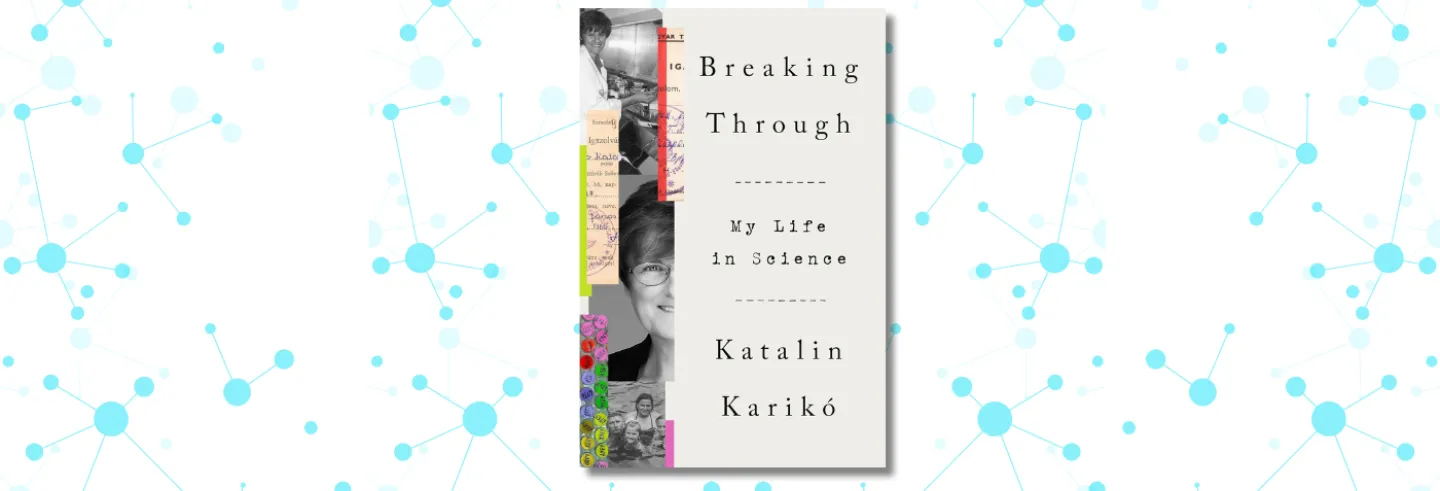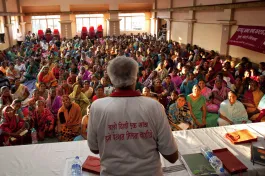Breaking Through: My Life in Science is the autobiography of Hungarian-American biochemist Katalin Karikó, and it tells the inspiring story of a determined woman who achieved great success in science. Karikó’s story is riveting. The daughter of a butcher, she rose from humble beginnings to share the 2023 Nobel Prize in Medicine with American immunologist Drew Weissman. Her work laid the scientific foundation for developing the mRNA-based Covid-19 vaccine, which helped millions avoid illness, hospitalisation, and possible death.
Before Karikó’s discoveries about mRNA, biologists already understood the basic workings of the cell and its key components, such as deoxyribonucleic acid (DNA) and ribonucleic acid (RNA). DNA, which carries genetic information, is packed into chromosomes inside the cell’s nucleus. Among the different types of RNA in the cell, messenger RNA (mRNA) plays a crucial role—it acts as an intermediary, carrying copies of the genetic code from the nucleus to the cytoplasm. There, the cell’s protein-making machinery, centered on ribosomes, uses this code to produce proteins.
One morning in 1985, when she was about to start her post-doctoral research at the University of Szeged, a letter informed her that the university would not continue funding her work.
The proteins are what keep us alive. All RNA, including mRNA, is temporary and they break down after their purpose is served, while DNA is meant to last forever. Karikó calls mRNA a middleman between information and action—DNA to RNA to proteins. Karikó’s work has centered on the workings of mRNA and the possibility of using it “to coax our cells into making specific proteins our bodies need to fight disease”.
It took more than a decade for mRNA technology to be ready for clinical use. One major reason for this was that mRNA is an unstable molecule and much research was required to make it a more stable carrier of information. Second, early mRNA vaccines were often associated with severe side effects. To make the vaccine more effective, Karikó and her colleagues developed ways to modify the standard nucleotide bases in mRNA. These changes helped reduce inflammation and control the immune response.
Karikó’s scientific journey, which began in communist Hungary, was an uphill one. One morning in 1985, when she was about to start her post-doctoral research at the University of Szeged, a letter informed her that the university would not continue funding her work. This forced her to look for opportunities abroad. Moving to the United States to continue her work, she opted to work at Temple University in Philadelphia. When Karikó arrived in the US from Hungary in 1985, the country was considered a beacon of hope in science with its thriving centres of learning, which attracted foreign talent.
The migration of scientists for either external or internal reasons was a major characteristic of the 20th century. When Nazism became a dominant political movement in Germany in the 1930s and 1940s, many scientists and researchers departed to work in the US. The biggest casualty in Europe was freedom of thought and action, which made scientific work difficult and motivated researchers to seek new pastures. Of course, Kariko’s migration with her husband and two-year-old daughter to the US was more because of a lack of funding for her work than political differences.
It was not very easy for her in the US, either. At Temple University, Karikó had to cope with her mentor’s volatile temperament and his insistence on being called “the Boss”. She had not expected such eccentric behaviour and frequent temper tantrums from a professor at an American university. After a couple of years, she shifted her lab to the cardiology clinic at the University of Pennsylvania, where she joined as research associate professor. This was neither a high-paying position nor one that would secure her tenure.
Though invited by an affable mentor, Karikó’s relations with higher officials at the university department turned sour because of her failure to attract funds. She was demoted in 1995, and her lab was shifted to a smaller facility without her consent. Fortunately for Karikó, German company BioNTech became interested in her work, and, with Pfizer’s backing, applied its findings to develop a vaccine to tackle the spread of the coronavirus. Karikó’s scientific journey highlights the power of perseverance and determination, especially in the face of adversity.
Kariko’s autobiography highlights a major flaw in today’s scientific culture—research is often judged by the number of publications rather than its true merit or quality.
Aside from the technical challenge mentioned earlier, the development of mRNA vaccines lagged for more than a decade also because of inadequate funding and scepticism among Karikó’s peers. A paper by Karikó and Weissman that outlined their findings was rejected by Nature in 2005. As a researcher, I know how painful rejection can be, but it is important to build resilience and not give in to discouragement. Such setbacks often occur repeatedly until the originality of a researcher’s work is recognised and accepted.
In science, proving one’s ability starts with publishing in prestigious journals, since publications and citations are the foundation of scientific status. Scientists who do not enjoy the support of a powerful peer group often find their goals frustratingly out of reach. Kariko’s autobiography highlights a major flaw in today’s scientific culture—research is often judged by the number of publications rather than its true merit or quality. This system, which rewards quantity over substance and attracts more funding, becomes self-perpetuating and can ultimately undermine truly ground-breaking work.
We are living in a calamitously unsteady world—brainwashed by misinformation and persuaded to follow a deeply divisive script circulated by the powerful, encouraging hate and othering. For researchers, this is a period of the slow erosion of scientific hope—the idea that if you work hard, publish well, and play fair, the doors of opportunity will open. The US was once a global leader in health research. However, the current government, led by vaccine sceptics, threatens the future of health research both at home and around the world. Misinformation about vaccine safety and effectiveness is now widespread in the US and internationally.
Science is now under siege in the US. Massive science budget cuts, assaults on universities, and funding uncertainties have given momentum to an exodus of scientists from the US to other parts of the world. Many researchers in the US who are just starting their projects may now be considering a move to Europe.
One common myth in science is the idea of the “lone genius”. In reality, modern science is a collaborative effort that relies on teams of people with diverse skills and expertise. This book tells us why we must build a more inclusive scientific community, where scientists from all backgrounds are encouraged, irrespective of their skin colour and origin. The absorbing story of Kariko’s life underscores the importance of perseverance, collaboration, diversity, and inclusion.
C.P. Rajendran is a geologist and adjunct professor at the National Institute of Advanced Studies, Bengaluru, known for his work in seismotectonics and tsunami hazards, especially in the Indian subcontinent.









